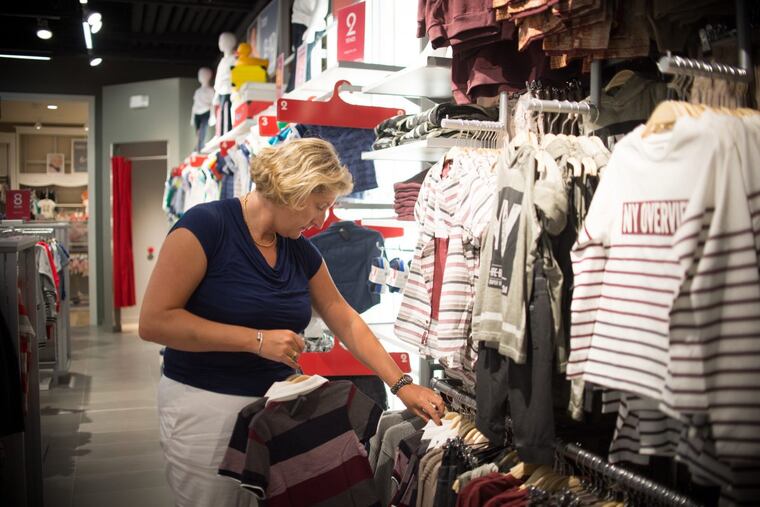So many clothing stores: What makes this French retailer different?
"What makes us different? I think it's the design of the clothing," Agathe Boidin, chief executive of Orchestra Prémaman USA Inc., the French kids' and babies' clothing retailer trying to make a place for itself in American retailing.

"What makes us different? I think it's the design of the clothing," said Agathe Boidin, chief executive of Orchestra Prémaman USA Inc., the French kids' and babies' clothing retailer.
Around the world, Orchestra Prémaman operates 600 stores, but just one in the U.S., in the King of Prussia Mall, with ambitions to open 10 to 20 stores a year, assuming they can crack the market. Next year? Cherry Hill.
"We have what we call "themes," a small collection where you can mix and match," said Boidin, who moved to Villanova from Montpellier, France a year ago. She became a fan of the U.S. at age 18 when she worked as an au pair in San Francisco and has always wanted to move back. Now she's here with her husband, three children and a charming French accent.
"You have three different tops and bottoms and trousers and skirts. It all goes together," she said during our Executive Q&A interview published in Sunday's Philadelphia Inquirer. "The same ambiance. The same color. So, it's easy for the moms to shop. So, we do that for girls, but also for boys and babies. That makes us different. The design of the clothes, I think, is more European style. So, we did some focus groups in Chicago and in Philadelphia. The moms said, `Wow, it's different. It's different from what we have in the United States. They like it. They really like it.'
"Also, compared with other French brands, we are really much more affordable," she said. "The average price is $12. I think it's a good way for those that like design and the fashion to get a nice product, but affordable."
You know what I noticed it just looking in your store for 10 seconds? More interesting clothes for boys. Anyone can make a little girl cute, but in the U.S., when I was buying clothes for my two sons, (now 28 and 26), my choices were athletic teams, super heroes or trucks. And if you didn’t like that, you were stuck with gray. So depressing.
We have color in each gender. We also do have a neutral colors, because in France you can have moms that don't want to know the sex of the baby. Also, we work with some soft colors, soft grays, soft green, soft blue. So, even if it's for a boy, you can buy it for a girl.
What about what kids wear? Any differences?
I think in terms of the basics: t-shirts, shorts, there is not much difference from Europe. It's the same. In the United States, I notice the clothing is really dressy, the shoes are really, really dressy, or really casual. But, you don't have really in the middle. I think with Orchestra we bring in the middle, a designer product.
What about maternity wear?
We do sell maternity wear in Europe, but not here. So, I'm less specialized. What I can see for myself is that in the United States, women wear a lot of dresses, more than in Europe.
Really? I always assume people in Europe are more dressed up than here.
I think it's the image that you have when you go to Paris and fashion week. I used to work for PriceWaterhouseCoopers [a major accounting firm] and we were all in trousers and suits, but not really dresses. Even for work or for day-to-day. I think Europeans, especially French women, we wear less and less dresses, which is too bad.
You see a lot of parents and children. Notice any differences in child-rearing practices?
In the U.S, they learn to speak out, to have confidence in what they are doing. To say, `Okay, you're good. You will make it.' I think even in the company I can see it, because I work with an American company where you are always so positive and say ` Okay, let's do that together.' In France, we do it, but we don't how to say, ` Thank you,' or ` It's good.' Maybe it's different mentality since sometimes we are shy to say `Oh, I'm good,' and `We are good.' It's more the mentality of the United States.
It starts with childhood?
Yes.
Next: When a big company hires like a start-up.